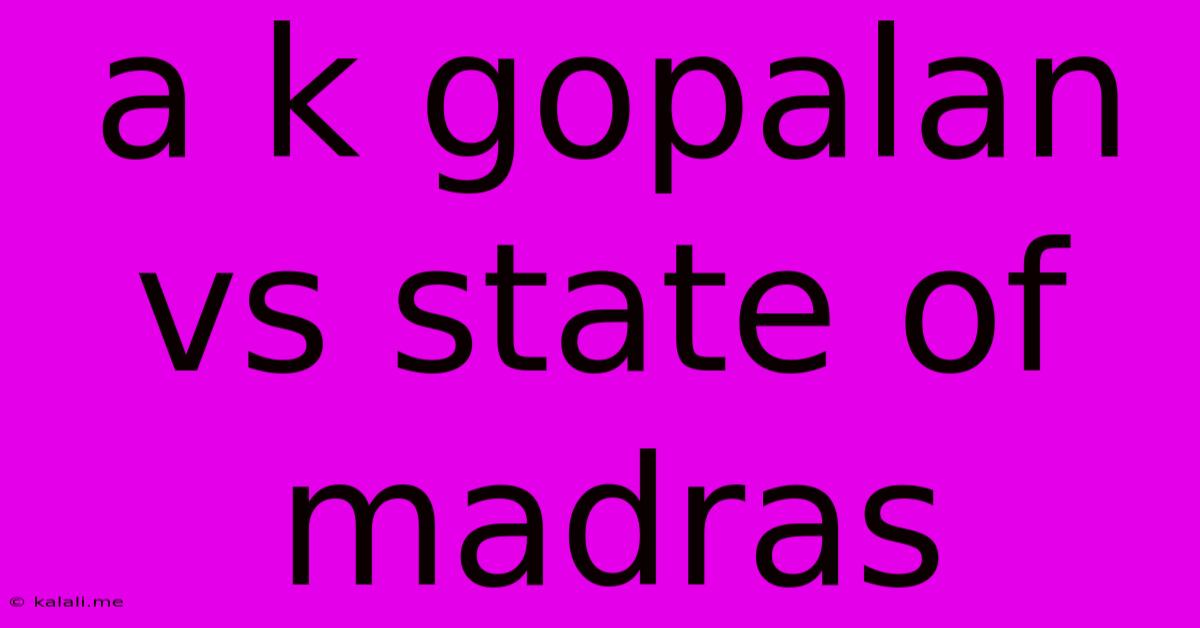A K Gopalan Vs State Of Madras
Kalali
Jun 15, 2025 · 3 min read

Table of Contents
A.K. Gopalan vs. State of Madras: A Landmark Case in Indian Constitutional Law
The case of A.K. Gopalan v. State of Madras (1950) is a cornerstone of Indian constitutional law, significantly shaping the understanding and interpretation of fundamental rights, particularly Article 21 (right to life and personal liberty). This landmark case, decided by the Supreme Court of India, dealt with the crucial question of the scope and limitations of the fundamental rights in relation to preventive detention laws. Understanding its implications requires delving into its facts, arguments, and the lasting impact it has had on the judicial landscape of India.
The Facts of the Case:
A.K. Gopalan, a prominent communist leader, was detained under the Preventive Detention Act of 1950. He challenged his detention, arguing that it violated his fundamental rights guaranteed under Part III of the Indian Constitution, specifically Article 21. The core of his argument centered on the assertion that preventive detention, without trial or charges, was an infringement on his right to personal liberty. The State of Madras, on the other hand, argued that the Preventive Detention Act was a valid law enacted within the constitutional framework, and the detention was justified for maintaining public order.
Arguments and Judgments:
Gopalan's counsel argued that Article 21 should be interpreted broadly to encompass all aspects of personal liberty, and that preventive detention violated this right. They contended that the Act lacked sufficient safeguards against arbitrary detention. The State's arguments, conversely, emphasized the necessity of preventive detention for maintaining public order and security, a power inherent in the state’s authority. They stressed that the Act provided specific grounds for detention and procedures for review, thus fulfilling the constitutional requirements.
The Supreme Court, in a majority judgment authored by Justice Patanjali Sastri, upheld the validity of the Preventive Detention Act and dismissed Gopalan's petition. The Court adopted a narrow interpretation of fundamental rights, focusing on their compartmentalization. It held that Article 21 only protects against arbitrary arrest and detention under criminal law, not preventive detention under a separate law. Critically, the Court concluded that each fundamental right in Part III was distinct and not interconnected. This "watertight compartment" theory significantly shaped the interpretation of fundamental rights in the subsequent years. The dissenting judges, however, argued for a broader, more holistic interpretation of Article 21.
The Legacy and Impact:
The A.K. Gopalan case became a landmark decision because of its interpretation of fundamental rights and its influence on subsequent judicial pronouncements. The "watertight compartment" theory, though later modified and nuanced, dominated judicial thinking for several years. It impacted how other fundamental rights were interpreted in relation to preventive detention and other state actions.
However, the case's narrow interpretation of Article 21 faced significant criticism and was eventually overturned, to an extent, by later judicial decisions. The evolution of judicial understanding on Article 21, particularly regarding its expansive scope to encompass various facets of personal liberty, including dignity and due process, significantly re-evaluated the principles laid down in Gopalan. Subsequent cases broadened the interpretation of Article 21 to include aspects that were not explicitly considered in the Gopalan case.
In conclusion, A.K. Gopalan v. State of Madras remains a pivotal case in Indian constitutional history. While its "watertight compartment" approach has been significantly refined and challenged by later judgments, its role in shaping early interpretations of fundamental rights and influencing debates around preventive detention is undeniable. Its historical significance lies in its impact on the development of Indian constitutional jurisprudence and the ongoing evolution of the understanding of fundamental rights. The case serves as a reminder of the continuous process of judicial interpretation and the dynamic nature of constitutional law.
Latest Posts
Latest Posts
-
Moment Of Inertia For A Square
Jun 16, 2025
-
What Is The Primary Purpose Of This Passage
Jun 16, 2025
-
Which Of The Following Statements About Gravitational Waves Are True
Jun 16, 2025
-
Which Statement Is True About Piagets Theory Of Cognitive Development
Jun 16, 2025
-
Resistance Is Measured In Units Of
Jun 16, 2025
Related Post
Thank you for visiting our website which covers about A K Gopalan Vs State Of Madras . We hope the information provided has been useful to you. Feel free to contact us if you have any questions or need further assistance. See you next time and don't miss to bookmark.